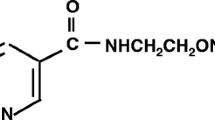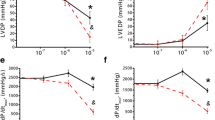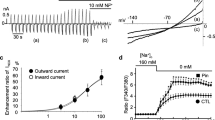Abstract
Objective: Acute myocardial ischaemia leads to a transient sensitisation of adenylyl cyclase which may contribute to the occurrence of malignant arrhythmias and the propagation of myocardial necrosis. It is prevented by blockade of protein kinase C (PKC) which is activated in early ischaemia as shown by its translocation from the cytosol to the plasma membranes. Translocation of PKC may also occur in ischaemic preconditioning, a process thought to be induced by activation of adenosine A1 receptors. In this study it was investigated whether A1 adenosine receptors may be involved in the sensitisation of adenylyl cyclase and the activation of PKC induced by ischaemia.
Methods:Isolated rat hearts were perfused with the specific A1 adenosine antagonist 8-caclopentyl-1,3-dipropylxanthine (DPCPX, 1 μM) or adenosine (1 μM) prior to ischaemia induced by stop of perfusion for 5 and 10 min. Adenylyl cyclase activity was determined in plasma membranes stimulated by forskolin or stimulated via β-receptors by isoproterenol. Total PKC activity was measured in purified plasma membranes and in the cytosolic fraction using histone III-S as a substrate.
Results:Myocardial ischaemia induced a β-receptor-independent sensitisation of adenylyl cyclase (forskolin-stimulated activity 515 ± 55 vs. 384 ± 30 pmol/min/mg protein) which was completely blocked by pre-perfusion with DPCPX (385 ± 23 vs. 386 ± 24 pmol/min/mg protein). DPCPX alone did not alter the responsiveness of adenylyl cyclase to stimulation. The stimulated adenylyl cyclase activity was increased by 20% after pre-perfusion with adenosine, mimicking the ischaemia-induced sensitisation. The effect of adenosine was not augmented by additional ischaemia. PKC activity was translocated from the cytosol to the plasma membranes by acute ischaemia, indicating an activation of the enzyme. This effect was completely abolished by DPCPX.
Conclusion: These data demonstrate that in the rat heart the sensitisation of adenylyl cyclase in acute myocardial ischaemia is dependent on activation of A1 adenosine receptors. It is suggested that the sensitisation of adenylyl cyclase by adenosine or ischaemia might be mediated by an activation of PKC.
Similar content being viewed by others
Author information
Authors and Affiliations
Additional information
Received: 23 October 1998, Returned for revision: 19 November 1998, Revision received: 8 February 1999, Accepted: 22 February 1999
Rights and permissions
About this article
Cite this article
Borst, M., Simonis, G., Röthele, J. et al. Blockade of A1 adenosine receptors prevents the ischaemia-induced sensitisation of adenylyl cyclase: evidence for a protein kinase C-mediated pathway. Basic Res Cardiol 94, 472–480 (1999). https://doi.org/10.1007/s003950050163
Issue Date:
DOI: https://doi.org/10.1007/s003950050163




